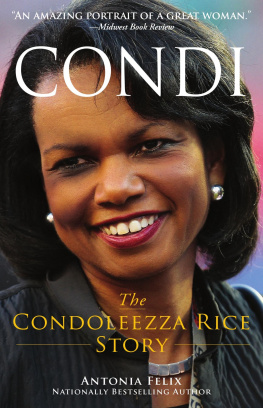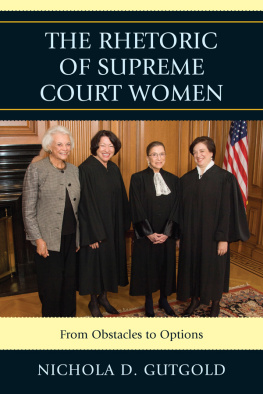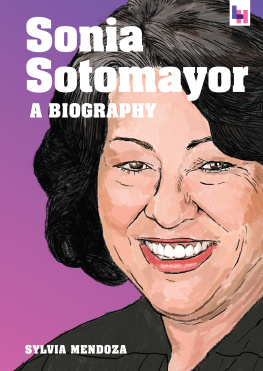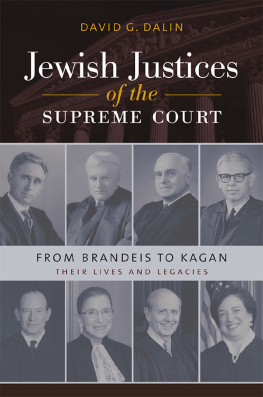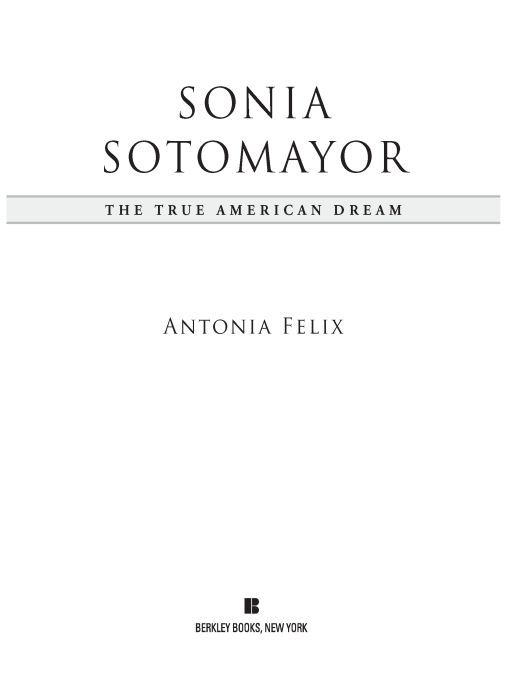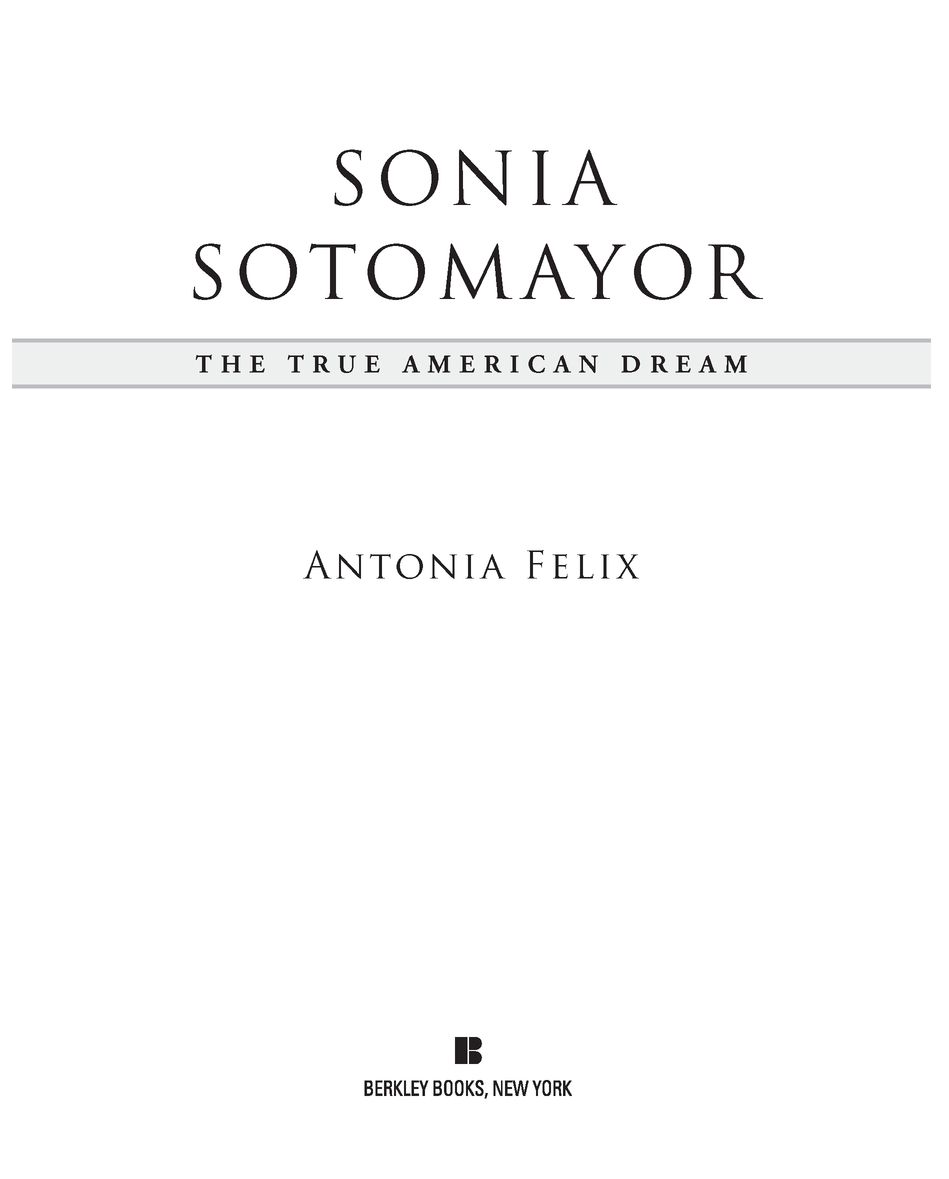Table of Contents
Most Berkley Books are available at special quantity discounts for bulk purchases for sales promotions, premiums, fund-raising, or educational use. Special books, or book excerpts, can also be created to fit specific needs.
For details, write: Special Markets, The Berkley Publishing Group, 375 Hudson Street, New York, New York 10014.
In memory of Margaret Rabb,
poet, mentor, and friend
And how do the roots know
they should rise up toward the sun?
And later, wave at the air
with such flowers and colors?
PABLO NERUDA, from The Book of Questions, LXXII
ACKNOWLEDGMENTS
Writing about Associate Justice Sonia Sotomayor has been rewarding on many levels. I have not only been moved and inspired by her story and those of her mother and extended family but have had the great fortune to meet some of the remarkable people in the law and other professions whose lives have crossed hers. Researching her ancestral background introduced me to a special corner of southwestern Puerto Rico to which I hope to return as often as possible. Of the many places around the world that have become dear to me, I have never experienced the degree of warmth, hospitality, or authentic pride of place I encountered there.
There are many to thank for their support of this work, beginning with my two interpreters in Puerto Rico: Edward G. Contreras Santiago and his uncle, Dr. Edward Santiago, both of Mayaguez. Their generosity and professionalism knew no bounds, and my life is richer for having met them. My thanks also go to Daniel Sanchez and Dr. Jorge Ballester for their translation services, and friends and family who assisted me in many ways, including Timothy Shaner, Christopher Measom, Joseph and Elizabeth Mahowald, Anne Wilson, Bruce Felix, Audrey Schindler, Lily Schindler, Dan Markowitz, and Allen and Myrna Comstock.
I am indebted to those who helped with research, including Elizabeth L. Mo and Boris Milman for their expert work in the New York Supreme Court Law Library; David G. Badertscher, Principal Law Librarian at the New York Supreme Court; Robyn K. Dexter at the U.S. Army Womens Museum; and Erica Chabot in Senator Patrick Leahys office. Thanks also to U.S. Supreme Court Public Information Officer Kathleen L. Arberg and to Jennifer A. Poggi at the White House.
Although I was not able to interview Justice Sotomayorshe announced after her nomination that she would not grant interviews because she did not want to show favoritism toward particular members of the mediamy conversations with dozens of figures in her life have provided the core of this book. It was a particular honor to meet Tito Baez, whose presence alone taught me much about Justice Sotomayor, and other members of her family who welcomed me into their homes.
I extend an enormous thank-you to all of my interviewees for sharing their insights and experiences. It was a pleasure to meet each of them and I am deeply grateful for their input:
Carlos Baez
Mario Baez
Tito Baez
Brian Brokate
Marc J. Citrin
George H. Cohen
Ruben Diaz Jr.
Jameson Doig
Joseph Evall
Ignatio Flores
John W. Fried
John Garcia
Patricia Gatling
Richard Girgente
Veronica Hrdy
Isabelle Kirshner
Robert H. Klonoff
Peter Kougasian
Richard L. Mattiaccio
Heather McDonald
Hugh H. Mo
Andrew Oberfeldt
Tom Ostertag
Cesar Perales
Jorge Rangel
Benito Romano
Theodore Shaw
Daniel Silverman
Steven Skulnik
Leovigildo Cotte Torres
Donald B. Zavelo
ANTONIA FELIX, January 25, 2010
PROLOGUE
EARLY on a Sunday morning in October, customers wander in and out of Tito Baezs bakery in Mayaguez to buy a libra, a freshly baked loaf of bread, and maybe a dulce or two. An elderly man in a bright blue shirt stops to shake Titos hand on his way to the counter. The smell of bread and coffee fills the place. Three young men sit down at the table next to us and speak quietly to each other as we drink our coffee and talk about Titos cousin, Sonia, and the changes that Puerto Rico has seen since her mother and father left during World War II.
Tito points at an abandoned white building with glass-block windows across the street, where three hundred women used to sew uniforms for the U.S. Army. Like many other factories in this west-coast region of the island, he says, it closed in the 1990s when American companies took their business to less expensive sources in Mexico and the Dominican Republic. The islands heavy loss of manufacturing has never been replaced and is partly responsible for the 15 percent unemployment rate.
The current global recession made another hit on the economy, and Tito has made adjustments to ensure that his longtime customers, each one a friend, can continue to buy their daily bread. The pastelillo manzane , mini apple turnovers on the top shelf of the case, cost twenty-five cents each, one-fifth the price of the traditional size. Although everyone is spending less these days, the small-size sweets mean that they can still get a little taste of everything, Tito says. As I chide him about how difficult it must be to roll up dainty pastries with his large hands, a man walks up and gives him a dollar bill. They exchange a few words, and my interpreter, Edward, tells me that the man was repaying Tito for a loaf of bread he had given him a couple of days earlier. Tito, Edward learns from the man, often gives his customers bread and newspapers and other small things. There is no risk, and there is no reason for anyone to go without bread in the morning. As Edward, a graduate student in English at the University of Puerto Rico-Mayaguez, informs me, bread is a ritual every morning. It is impossible to imagine a day that does not start without it. I can see why: the bread is amazingly white and soft, covered with a delicate crust.
I feel guilty about keeping Tito from his customers, but he stays at our table to answer my questions about his business, the people at the counter, and their hard times. Like other bakery owners, he added a small grill to his kitchen to offer sandwiches and bring in business throughout the day. Over the past thirty years, other shops in the neighborhood have come and gone, but Titos ingenuity and personable nature have made his place a permanent fixture in this section of town called Yaguez.
When Tito talks about his recent trip to Washington to attend Sonias installation to the Supreme Court, he squeezes his hands together as if to hold himself in check. His cousin has been a source of pride for a very long time, and her latest accomplishment appears to be overwhelming. She has always remained the same person, he says, no matter how far up she has gone. Everything about her is expressed in her smile, which she gives so easily and which reveals her true nature. Her smile is powerful, he tells me, because it is so genuine.
Everyone with whom I had spoken before visiting Mayaguezlawyers, professors, and other colleagues in the United States who have known Sonia Sotomayor through the yearshad described her in similar terms: warm and generous with an intense focus, seemingly unlimited capacity for work, and New York gregariousness.
The thread that connects Sonia Sotomayor to Mayaguez extends a few miles southeast to a smaller town called Lajas, where her mother, Celina, was born, and back east to San Juan, her fathers hometown. The stories that resound within that network have come up in her speeches as she traces the foundations of her success. Whether giving a college commencement address or making remarks at a judicial installation ceremony, she consistently glosses over her accomplishments and emphasizes the story of her mothers rise from unimaginable poverty. Her pride in that story blends ironically and inseparably with the humility and sacrifice of the tale itself.


